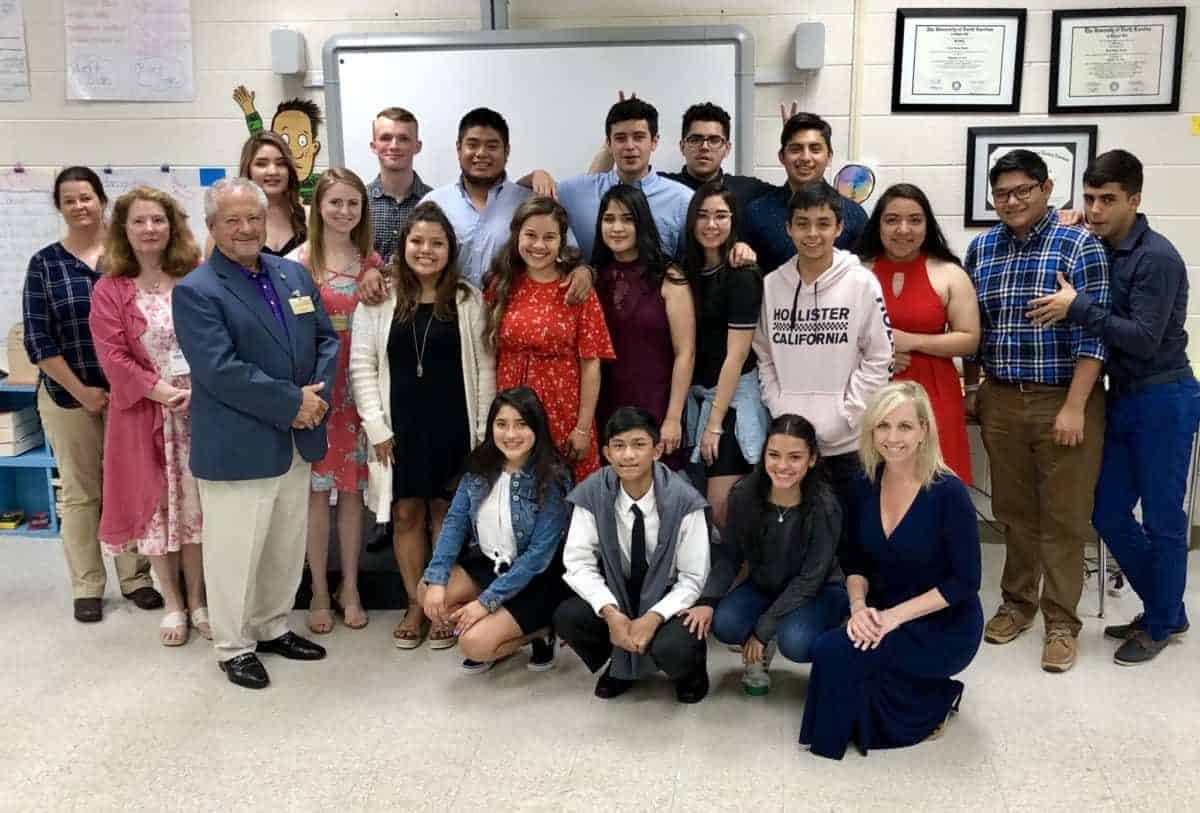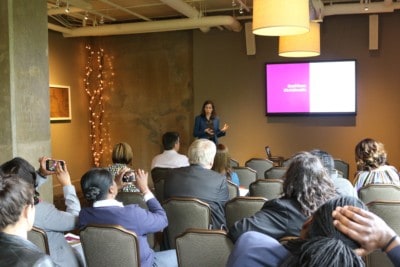

Over the course of a semester, what started as a high school English class became much more to 18 students and one R-S Central teacher.
Julie Pittman’s “sheltered instruction” class taught English I through IV coursework to a mixed-grade group composed entirely of English as a Second Language (ESL) students. They came to Rutherford County from Mexico, Brazil, Colombia, Costa Rica, the Philippines and other parts of the United States – born to ESL families.
In the past few months, the group has gotten to know Rutherfordton leaders, visited important town sites and held a mock Town Hall meeting that led to real solutions for the local government. They’ve explored civic engagement, community and most standard high school subjects – all while developing improved language skills and a stronger sense of belonging.
For Pittman, the experience has been eye-opening.
“I’m a different person because of these kids,” she said this week, her voice quavering slightly. “I look at the barriers that several of them face. They could be language barriers, cultural barriers, family, discrimination. But then, I also just look at how resilient they are and how determined they are to do what they are in my class to do every day, and that is to learn.”
Pittman proposed the individual sheltered instruction class after several years of working with and advocating for ESL students in her homeroom. This year, there were enough ESL students enrolled at Central to support a full class, so, following a great deal of research – with the help of ESL teacher Londa VonWeter – a class was offered this spring.
It focused on speaking, understanding, reading and writing English. The students’ proficiency levels in the language varied. Many were already fluent, but several were not. The class helped them progress in the ESL program.
It also helped them improve in other courses. Throughout the week, they would work in small groups, with those who were stronger in specific subjects tutoring those who were struggling. As they did this, they worked on English conversation and vocabulary. There were also regular English class assignments, discussions and projects related to language and literature.
‘Part of the larger community’
Josh Keller – an 18-year-old in Pittman’s AP English class who did his senior project on different types of learning for Spanish-speaking ESL students – was a peer helper in the ESL English class, assisting with lessons and translating. He said it was “inspiring” to see how hard the students worked to overcome challenges.
“It’s stressful when you don’t speak the language, when you have that barrier, and you’re taking the same classes as everybody else,” he observed. “It’s definitely difficult.”
Some of the ESL students concurred.
Juan, 18, was born in Mexico and moved to the United States about three years ago. His brother, David, 15, was born here. (Per requests, The Daily Courier is not including the brothers’ last names.) David is completely bilingual, but Juan knew very little English when the semester began.
David said the class helped his non-English-speaking peers feel more at home in the school. Juan added that the class was a unique experience.
“In other classes, I don’t talk much to the other people,” said Juan. “(In this class), we had communication – because (other students) speak Spanish.”
Pittman noticed a need for belonging among her students. Because many in the ESL program are born outside the United States, she said, they can feel disconnected from their school and the greater community. She decided to use the class to address that issue.
Through conversations Rutherfordton town leaders like Mayor Jimmy Dancy, Town Manager Doug Barrick, business owner Cindy Cope and Community Development Director Stephanie Rzonca, Pittman developed lessons and experiential activities to help the students understand how the town worked and how they could play a role in it.
“My hope was that, through civic engagement, these students would feel like they were part of the larger community,” she said.
Rzonca visited the class and gave a presentation on Rutherfordton and community government. Armed with their new knowledge, the class elected representatives. On a field trip to Town Hall – in which they met Dancy, Barrick and town department heads – the students held a mock town council meeting in which Rzonca presented the real-life issue of downtown parking with which Rutherfordton had been grappling.
The classroom council debated solutions to the parking problem and then tabled it to discuss further in class. The following week, they met with downtown businesses and parking officials to gather input, taking into consideration the historic preservation of certain downtown buildings.
Ultimately, the students came up with parking revisions and presented them at the May 1 Rutherfordton Town Council meeting. Soon after, Barrick told the class that Rutherfordton’s Public Works team had come up with a solution to the parking problem that was inspired by the students’ vision.
David said it felt good for the class to be heard.
“Knowing that they were able to help find a solution to a problem helped them feel more like a part of the community,” he said. “It was special to know you came up with some ideas and it inspired an idea that was put to use.”
The class made other field trips, too, to places like the Soil and Water Conservation headquarters and Rutherfordton’s wastewater treatment facility.
‘Advocating for each other’
On the last day of class, the students threw a Mexican fiesta. At the end, Juan – who Pittman said was a class leader – encouraged all of the students to make impromptu farewell speeches. He also addressed each student individually, telling them how important they were and that they shouldn’t let anything stand in the way of pursuing the life they want.
Pittman was moved. She said her ESL students will have a lasting impact on her.
“This class comes to school willing to work, ready to learn, wanting to help each other, wanting to talk, wanting to be successful,” she said. “More importantly, they want to belong and they want to have relationships. What they have done in this class is built a family of friends and peers and teachers and advocates, and they are advocating for each other and loving each other through life every single day.”
Pittman also improved her own Spanish in working with the students. This will serve her well this week as she embarks on a trip to Mexico as a delegate for Go Global NC’s Global Teachers – Mexico 2019 program.
On the trip, Pittman and her fellow local delegate, Angela Lowery – a first and second grade teacher at Pinnacle Elementary School – will learn about Mexico’s history, culture and environment. They will also identify the impact of cultural factors on student learning and achievement.
“My hope is that, when I go on this trip, it will be a true walk of empathy, that I will see what people do to get to the United States to be able to learn the things that we teach in our public schools, to be a part of the communities that we are building in our cities and towns and counties and to work and be contributing, awesome human beings,” said Pittman.
She said she hopes to see more classes like the one she taught this semester offered in the future, as they are needed.
David hopes so too. He said it would help ESL students – who spend most of their days in classes full of fluent English-speakers – feel less isolated.
“Some kids probably didn’t really communicate outside the (sheltered instruction) classroom at all,” he said. “In that classroom, they communicated a lot, they talked a lot, they were happy in class.”
Editor’s note: This piece was first published by the Daily Courier. It has been posted with the author’s permission.




